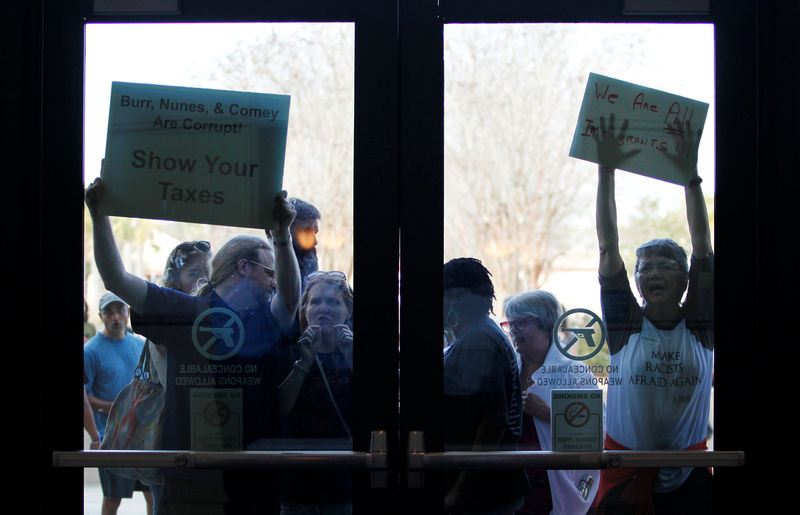By Harriet McLeod
NORTH CHARLESTON, S.C. (Reuters) - U.S. Senator Tim Scott faced a quandary on Saturday in hosting his town hall: he promised to meet with his South Carolina constituents, but he wanted to avoid the kind of adversarial free-for-all so many Republicans encountered this week.
Scott decided to ban placards from his North Charlestown meeting in hopes of averting the raucousness that erupted at dozens of town halls during the first congressional recess of Donald Trump's month-old presidency.
The senator also required the crowd submit questions in writing ahead of time after other Republican lawmakers faced a wave of anger on issues ranging from Trump's immigration and healthcare policies to the president's ties to Russia.
Despite Scott's precautions, arguments broke out and constituents told one another to shut up, though many in the audience - mostly white and over the age of 50 - said the senator remained respectful and sincere. And it never degenerated into an all-out shouting match.
Scott, the only African-American Republican in the U.S. Senate, began his town hall by pulling slips of paper from a box and reading the questions aloud. But the overflow audience of 300, evenly divided between Trump opponents and supporters, reacted with loud boos and cheers, even before he could begin to answer.
To a question about a rise in hate crimes, Scott said the trend predates the president's campaign.
"We can blame Trump for a lot of things but I don't think we can blame him for this one," he said, following a pattern of distancing himself from Trump without directly criticizing him.
"Some people have come to the conclusion that this president has already failed," Scott said. "I hope that most of us, whether you voted for him or not, hope that he succeeds."
When asked about Trump's repeated denunciations of the media, Scott said he believed the press was more biased than in the past. Even so, he said, "I do not believe the press is an enemy to the American people," a phrase coined by the president.
Still, the meeting's format started to break down almost from the outset, with the audience shouting asides, while others tried to silence them. Scott answered some of the comments, but if he was interrupted, he tried to talk over the offender.
"LET THE MAN ANSWER"
The confrontational tone of this week's town halls is part of a tide of anti-Trump protests, marches and rallies that show little sign of abating just over a month into the new administration.
The anti-Trump energy has prompted talk of a liberal-style Tea Party movement, in reference to the protests in 2009 that helped reshape the Republican Party and arguably laid the groundwork for Trump's surprise electoral victory last year.
At Scott's town hall, the senator did allow a mother to stand up and tell her story. She said one of her two premature children died and the other was 6 years old with medical bills totaling more than $2 million, she said tearfully.
"The Affordable Care Act is imperfect but it is a good law. It saved my family," she said to a standing ovation, referring to the health care program known as Obamacare.
"That's a heartbreaking story," Scott said, pointing out that he chose ACA coverage for himself and his staff. Even so, "Obamacare is not sustainable."
The session almost broke down when a man stood up and faced the crowd as audience members were peppering Scott with loud comments. "Let the man answer the question," the man said on the senator's behalf. "Sit down and shut up."
Two men who wore red "Make America Great Again" hats clapped loudly. Arguments broke out in the crowd.
Eventually, Scott threatened to walk out.
"I know we prefer to blame Trump for our incivility," he said. "Let me ask, if we want to continue this conversation, that we do so in a way that no one feels threatened."
His admonitions appeared to work. Order was eventually restored, and Scott gave up on picking questions from the box and started calling on audience members if they raised their hands. The session ended on a relatively civil note.

(Story corrects paragraph 5 to read "the only African American Republican in the U.S. Senate" instead of "the only African American in the U.S. Senate".)